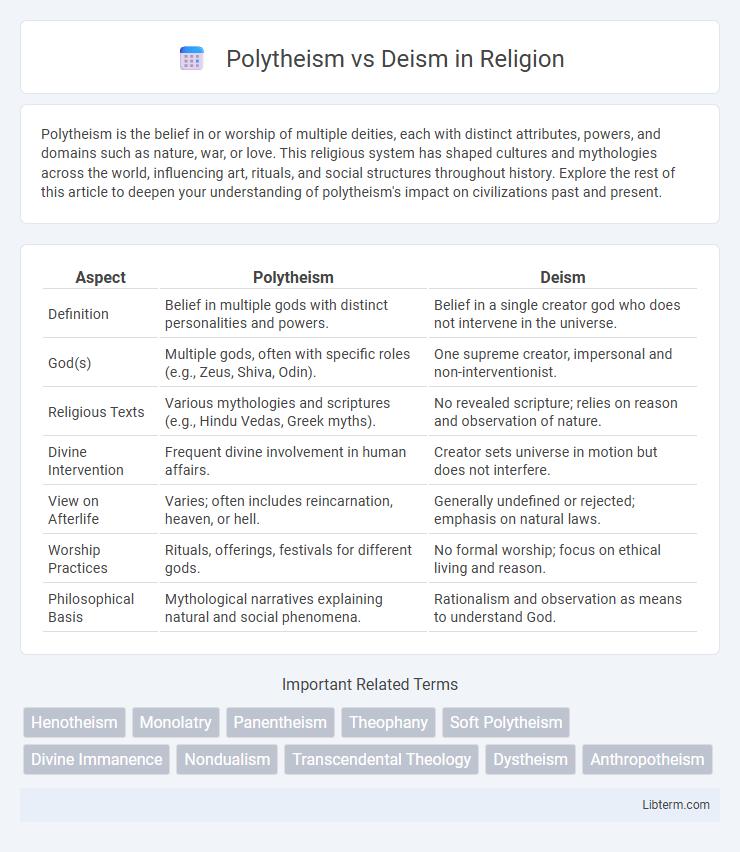Polytheism is the belief in or worship of multiple deities, each with distinct attributes, powers, and domains such as nature, war, or love. This religious system has shaped cultures and mythologies across the world, influencing art, rituals, and social structures throughout history. Explore the rest of this article to deepen your understanding of polytheism's impact on civilizations past and present.
Table of Comparison
| Aspect | Polytheism | Deism |
|---|---|---|
| Definition | Belief in multiple gods with distinct personalities and powers. | Belief in a single creator god who does not intervene in the universe. |
| God(s) | Multiple gods, often with specific roles (e.g., Zeus, Shiva, Odin). | One supreme creator, impersonal and non-interventionist. |
| Religious Texts | Various mythologies and scriptures (e.g., Hindu Vedas, Greek myths). | No revealed scripture; relies on reason and observation of nature. |
| Divine Intervention | Frequent divine involvement in human affairs. | Creator sets universe in motion but does not interfere. |
| View on Afterlife | Varies; often includes reincarnation, heaven, or hell. | Generally undefined or rejected; emphasis on natural laws. |
| Worship Practices | Rituals, offerings, festivals for different gods. | No formal worship; focus on ethical living and reason. |
| Philosophical Basis | Mythological narratives explaining natural and social phenomena. | Rationalism and observation as means to understand God. |
Defining Polytheism and Deism
Polytheism is the belief in multiple gods or deities, each with distinct roles, powers, and attributes, often associated with natural forces or human experiences. Deism centers on the belief in a single, non-interventionist creator who set the universe in motion but does not interfere with its functioning or human affairs. These contrasting views define polytheism as a religion with diverse divine agents, while deism emphasizes a singular, impersonal creator.
Historical Origins of Polytheism
Polytheism originated in ancient civilizations such as Mesopotamia, Egypt, and Greece, where multiple gods personified natural forces and societal roles. These deities often reflected cultural values and were worshiped through rituals and myths that explained the world's complexity. The historical roots of polytheism predate organized monotheistic religions, serving as foundational frameworks for early human understanding of the divine.
The Emergence of Deism
The emergence of Deism in the 17th and 18th centuries marked a philosophical shift from polytheism's worship of multiple gods toward belief in a single, rational Creator who does not intervene in the universe. Influenced by the Scientific Revolution and Enlightenment thinkers like John Locke and Voltaire, Deism emphasized reason, observation, and natural law over religious dogma and supernatural revelation. This intellectual movement challenged traditional polytheistic myths by promoting a worldview grounded in empirical evidence and the inherent order of nature.
Core Beliefs: Polytheistic Traditions
Polytheistic traditions embrace the belief in multiple gods, each governing specific aspects of the natural world and human experience, such as fertility, war, and the harvest. These deities often possess distinct personalities, stories, and rituals that shape cultural practices and religious ceremonies. Worship in polytheism typically involves offerings, prayers, and festivals dedicated to individual gods to seek favor and balance in life.
Core Beliefs: Deistic Perspectives
Deistic perspectives emphasize belief in a single, impersonal Creator who established the universe's natural laws without ongoing intervention or miracles. Unlike polytheism's worship of multiple gods with distinct personalities and roles, deism rejects divine revelation, prophecy, and sacred texts as sources of knowledge. Central to deism is the reliance on reason and observation of the natural world to understand God, reflecting a rationalist approach to spirituality.
Major Polytheistic Religions Worldwide
Major polytheistic religions worldwide, such as Hinduism, Shintoism, and ancient Greek and Roman faiths, emphasize the worship of multiple gods and goddesses, each embodying distinct aspects of life and the cosmos. These religions often involve elaborate rituals, mythologies, and temples dedicated to various deities, reflecting diverse cultural traditions. In contrast to deism, which posits a single creator god uninvolved in human affairs, polytheism promotes a rich pantheon with interactive divine beings influencing natural and social phenomena.
Deism's Influence on Enlightenment Thought
Deism significantly influenced Enlightenment thought by promoting reason and empirical evidence over religious dogma, fostering a shift towards secularism and critical inquiry. Philosophers such as Voltaire and Thomas Jefferson embraced deist principles, emphasizing a rational understanding of God that avoided orthodox religious rituals and supernatural claims. This intellectual movement contributed to the development of modern science, human rights, and democratic ideals by encouraging individualism and skepticism of established religious institutions.
Contrasts in Worship and Ritual
Polytheism involves worship of multiple deities, each with distinct personalities and domains, leading to diverse rituals, sacrifices, and festivals unique to each god or goddess. Deism rejects organized worship and rituals, promoting belief in a single, non-interventionist creator whose existence is understood through reason and observation rather than ceremonial practices. The contrast lies in polytheism's emphasis on direct interaction with gods through elaborate rites versus deism's reliance on natural theology and absence of formal religious ceremonies.
Polytheism and Deism in Modern Society
Polytheism in modern society often manifests through cultural festivals, artistic expressions, and the revival of ancient religions, reflecting diverse belief systems emphasizing multiple deities with specific domains. Deism appeals chiefly to intellectual circles and spiritual seekers who prioritize reason and natural law over organized religion, advocating a non-interventionist creator. Both frameworks influence contemporary debates on spirituality, secularism, and religious pluralism, shaping modern views on divinity and human existence.
Comparing Worldviews: Key Differences
Polytheism involves belief in multiple gods, each with distinct personalities and domains, shaping diverse rituals and mythologies across cultures. Deism centers on a singular, impersonal creator who initiates the universe but does not intervene in human affairs or natural events. The key difference lies in polytheism's interactive divine pantheon versus deism's detached, non-interventionist deity.
Polytheism Infographic

 libterm.com
libterm.com